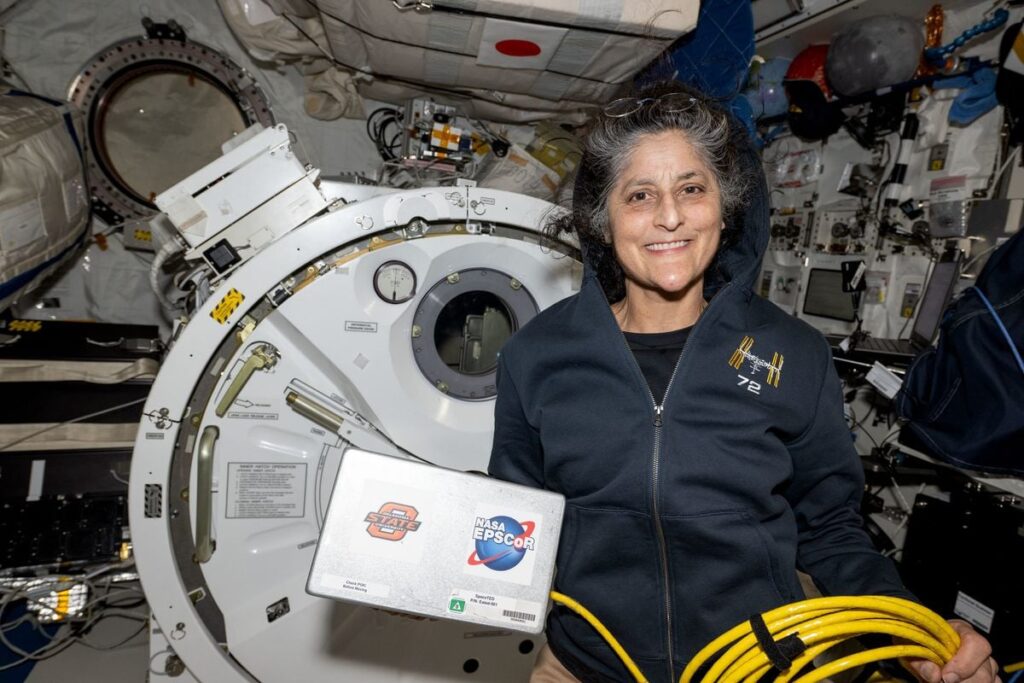One of the images that triggered rumors about astronaut Suni Williams’ health. Here, she displays radiation measurement hardware.
NASA Johnson
This fall, NASA released photos of astronaut Suni Williams—who is currently living on the International Space Station (ISS)—that triggered an onslaught of tabloid and social media rumors speculating about her health.
Articles in the New York Post and the Daily Mail suggested that Williams looked gaunt, and sources quoted by the outlets alleged the astronaut had lost an unhealthy amount of weight.
In early November, NASA refuted the claims in a statement emailed to the press. This week, Williams herself negated the rumors in an in-flight interview. Now, James D. Polk, NASA’s chief health and medical officer, has once again spoken up to dispel the idea.
“I’ll tell you the astronauts are in absolutely outstanding health and in good condition right now,” Polk tells Space.com’s Monisha Ravisetti. “So, let me just address that rumor right out the front.”
Williams and fellow NASA astronaut Butch Wilmore are in the middle of an unexpectedly long stay on the ISS. They traveled to the station aboard Boeing’s Starliner spacecraft in June for what was supposed to be a brief mission. After Starliner experienced technical issues, however, NASA decided send the spacecraft back to Earth without its crew. In late August, the agency announced the two astronauts will come home aboard a SpaceX Dragon in February 2025, turning their intended eight-day stay into eight months. Experts noted that both Williams and Wilmore are experienced astronauts trained for extended stays at the ISS.
With the pair now 163 days—and counting—into their odyssey, some of the recent rumors about their health were centered around the negative effects of long-term residencies in space.
The image that seems to have attracted the most attention is a picture of Williams and Wilmore making pizza aboard the space station’s galley. Vinay Gupta, a pulmonologist and health policy analyst, told the Daily Mail that Williams’ face looked “sunken” and she appeared underweight.
NASA astronauts make pizza aboard the International Space Station in a picture that triggered rumors about Williams’ weight.
NASA Johnson
The following week, Williams attempted to reassure the public that she was in good health: “I think there’s some rumors around outside there that I’m losing weight and stuff,” she said in an interview from the station with the New England Sports Network. “No, I’m actually right at the same amount… as I was when I got up here,” she continued, adding that she works out regularly, as all astronauts in space do, to prevent the decrease in muscle mass and bone destiny that results from long periods of time in microgravity.
“I could definitely tell that weightlifting, which is not something that I do all the time, has definitely changed me. My thighs are a little bit bigger, my butt is a little bit bigger,” she also noted, per Space.com’s Mike Wall.
The next day, though, the New York Post cited an anonymous NASA insider, who maintained that both Williams and Wilmore are losing body mass, adding that Williams has been affected more than Wilmore.
On Thursday, Polk once again refuted these allegations in several media interviews.
“I’ve known Suni 20 years, and I’ll tell you, Suni looks the same to me,” he tells the New York Times’ Kenneth Chang. “She’s in incredible health right now.”
“I hope that the chief medical officer of NASA is an informed and credible source—I’ll put it that way,” Polk says to Space.com, referring to himself.
He adds that fluid shift—when weightlessness leads bodily fluids to flow toward the upper parts of the body—along with the daily aerobic and resistive exercises that astronauts do on the ISS can cause “morphologic changes that occur that can perhaps change their appearance.” Still, he reiterates that “their weight has not changed, and their fitness is actually getting better.”
The speculation on Williams’ weight comes amid other questions regarding the health of three NASA astronauts and one Russian cosmonaut who were taken to a hospital after they returned to Earth from the ISS last month. One member of the crew was kept overnight, but for privacy reasons, NASA has not revealed the identity of the individual or released information on the nature of their medical issue.


